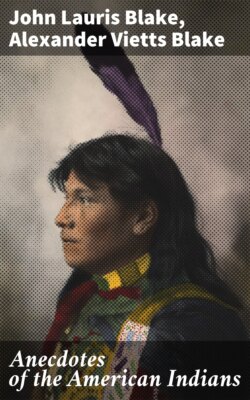Читать книгу Anecdotes of the American Indians - John Lauris Blake - Страница 9
На сайте Литреса книга снята с продажи.
THE FOLLOWING IS THE INCIDENT ON WHICH THE FOREGOING LINES ARE FOUNDED.2
ОглавлениеTable of Contents
Billy Weatherford, the celebrated savage warrior, is, at length, vanquished—the destroyer is conquered—the hand which so profusely dealt death and desolation among the whites, is now paralyzed—it is motionless. He died at his late residence near Montpelier, in this state, on the 9th inst. His deeds of war are well known to the early settlers in South Alabama, and will be remembered by them while they live: and be talked of, with horror, by generations yet unborn. But his dauntless spirit has taken its flight—“he is gone to the land of his fathers.”
Billy Weatherford, denominated ‘The Prophet’ was about one-fourth Indian (some say a half breed) his ancestry, on the white side, having been Scottish. It has been said, that he boasted of having no Yankee (meaning American) blood in his veins.
This ferocious chief led the hostile Indians to the attack of Fort Mimms, at Tensau, on the 30th of August, 1813; which resulted in the indiscriminate massacre of men, women, and children, to the number of near four hundred. He was also a leader associated with the prophets Francis and Sinquister, at the battle fought on the 23d of December following, at Ekchanachaca, or ‘The Holy Ground;’ which had been considered by them inaccessible to their enemies, and the ‘Grave of White Men.’ But it proved a fatal delusion. His party suffered great loss of warriors, and all the provisions, munitions of war, &c., deposited at this place of imaginary security; being, as they supposed, rendered secure by the protecting influence of some supernatural agency.
It is stated, that—after being sated with the blood of Americans, and witnessing the almost total extinction of his warriors—he voluntarily and dauntlessly flung himself into the hands of General Jackson, and demanded his protection. He is said, on surrendering himself, to have made the following speech to the General—which looks very little like claiming protection. It displays a spirit, which would have done credit to Napoleon, under similar circumstances, after the battle of Waterloo:
“I am in your power: do with me what you please. I am a soldier. I have done the white people all the harm I could. I have fought them, and fought them bravely. If I had an army, I would yet fight, and contend to the last. But I have done—my people are all gone—I can do no more than weep over the misfortunes of my nation. Once I could animate my warriors to battle: but I cannot animate the dead. My warriors can no longer hear my voice—their bones are at Talladega, Tallaschatchee, Emuckfaw, and Tohopeka. I have not surrendered myself thoughtlessly. Whilst there were chances of success, I never left my post, nor supplicated peace. But my people are gone, and I now ask it for my nation, and for myself.
“On the miseries and misfortunes brought upon my country, I look back with the deepest sorrow, and wish to avert still greater calamities. If I had been left to contend with the Georgian army, I would have raised my corn on one bank of the river, and have fought them on the other. But your people have destroyed my nation. You are a brave man. I rely upon your generosity. You will exact no terms of a conquered people, but such as they should accede to. Whatever they may be, it would now be madness and folly to oppose them. If they are opposed, you shall find me among the sternest enforcers of obedience. Those who would still hold out, can be influenced only by a mean spirit of revenge; and, to this, they must not, and shall not, sacrifice the last remnant of their country. You have told us, where we might go, and be safe. This is a good talk, and my nation ought to listen to it. They SHALL listen to it.”3
